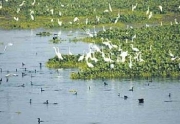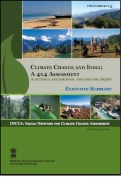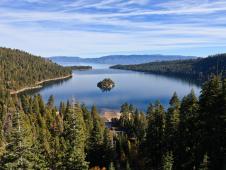Ecology and Environment
The Wetlands (Conservation and Management) Rules by Ministry of Environment and Forests (2010)
Posted on 10 Dec, 2010 07:27 AM The Wetlands (Conservation and Management) Rules was notified in December 2010 by the Ministry of Environment and Forests to ensure better conservation and management and to prevent degradation of existing wetlands in India. Wetlands are critical for human development and wellbeing, especially in India where a large number of people are dependent on them for drinking water, food and livelihood. Despite their immense importance, wetlands are one of the most degraded ecosystems globally.
The Wetlands (Conservation and Management) Rules was notified in December 2010 by the Ministry of Environment and Forests to ensure better conservation and management and to prevent degradation of existing wetlands in India. Wetlands are critical for human development and wellbeing, especially in India where a large number of people are dependent on them for drinking water, food and livelihood. Despite their immense importance, wetlands are one of the most degraded ecosystems globally.
Wildlife Wetlands Photography Contest & Young Environmentalists Programme
Posted on 09 Dec, 2010 10:48 AMWildlife Wetlands Photography Contest by WWF & Young Environmentalists Programme in association with Meluha-The Ferns ecotel, Hiranandani Gardens Powai, Mumbai-400076 on 2nd February 2011.
World Wetlands Day Photography Submissions
A brand new photography international competition is here, the WWF & YEPT in association with Meluha-The Ferns ecotel awards celebrates and recognizes the talents of photographers of all nationalities highlighting the great wealth and diversity of wetlands and wildlife on Planet Earth.
On the brink: Water governance in the Yamuna river basin in Haryana
Posted on 08 Dec, 2010 10:07 PMThis study attempts to develop a case study of the Western Yamuna Canal Command in Haryana with the purpose of developing a general picture of the institutional environment and arrangements related to water resource development and use in the State of Haryana. It is based on a review of water law, policy and administration and helps draw conclusions on whether the existing governance systems are meeting the current needs and suggests alternate options. The study has attempted to test the following hypothesis –
Glimpses of Ladakh - An exhibition of photographs, LEDeG, New Delhi
Posted on 08 Dec, 2010 04:15 PMOrganizer: Ladakh Ecological Development Group (LEDeG)
Degraded and wastelands of India - Status and spatial distribution
Posted on 07 Dec, 2010 10:16 PMThis book by NAAS and ICAR builds-on and integrates work done by different institutes of the ICAR and the Department of Space in the area of degraded and wastelands in India. NRSA had already published the state level and country level information earlier. In addition, the nature and causes of the land degradation, and the degree and extent of damaged lands needed to be determined, so that appropriate management strategies could be designed and implemented in a defined time-frame to bring these lands to ‘productive health’.
Guidelines for Assessing the Risk to Groundwater from On–Site Sanitation (ARGOSS)
Posted on 05 Dec, 2010 05:37 PMThese "Guidelines for Assessing the Risk to Groundwater from On–Site Sanitation (ARGOSS)" were developed to provide guidance on how to assess and reduce the risk of contamination of groundwater supplies from on–site sanitation systems and are aimed at those responsible for planning low cost water supply and sanitation schemes. The manual developed by the British Geological Survey has been field tested between 1999 and 2003.
Climate change and India - A sectoral and regional analysis for 2030s by the Indian Network for Climate Change Assessment (INCCA)
Posted on 05 Dec, 2010 10:45 AM This report prepared by the Indian Network for Climate Change Assessment (INCCA) provides an assessment of impact of climate change in 2030s on four key sectors of the Indian economy, namely agriculture, water, natural ecosystems & biodiversity and health in four climate sensitive regions of India, namely the Himalayan region, the Western Ghats, the Coastal Area and the North-East Region. This is the for the first time that such a comprehensive, long term assessment has been undertaken based on rigorous scientific analysis for the 2030s (all previous assessments were for the 2070s and beyond).
This report prepared by the Indian Network for Climate Change Assessment (INCCA) provides an assessment of impact of climate change in 2030s on four key sectors of the Indian economy, namely agriculture, water, natural ecosystems & biodiversity and health in four climate sensitive regions of India, namely the Himalayan region, the Western Ghats, the Coastal Area and the North-East Region. This is the for the first time that such a comprehensive, long term assessment has been undertaken based on rigorous scientific analysis for the 2030s (all previous assessments were for the 2070s and beyond).
The Wetlands (Conservation and Management) Rules, 2010 notified by the MoEF
Posted on 04 Dec, 2010 01:01 PMThe Ministry of Environment and Forests today notified the Wetlands (Conservation and Management) Rules, 2010. These Rules have been drafted by the Ministry of Environment and Forests to ensure better conservation and management and to prevent degradation of existing wetlands in India.
Water security for India: The external dynamics - An IDSA Task Force Report
Posted on 01 Dec, 2010 08:44 PMThe report by Institute for Defence Studies and Analyses is premised on the fact that India is facing a serious water resource problem and is expected to become 'water stressed' by 2025 and 'water scarce' by 2050. It raises fundamental questions about the forces driving water demand and the political dynamics of riparian relations, both in terms of hindrances and opportunities, amongst states in the subcontinent. Rivers, a crucial source of water resources, physically link upstream and downstream users and at the same time create barriers.
NASA study finds earth's lakes are warming
Posted on 01 Dec, 2010 11:14 AM Lake Tahoe, seen here from Emerald Bay, was one of the primary validation sites for the global lake study. Image credit: NASA/JPL-Caltech
Lake Tahoe, seen here from Emerald Bay, was one of the primary validation sites for the global lake study. Image credit: NASA/JPL-Caltech




